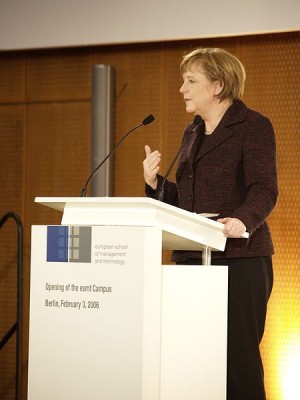A few days ago “Le Monde” leaked an official document of the French Socialist Party blaming European center-right governments of “cynicism and blind austerity”. The primary focus of the document was Chancellor Angel Merkel, whom the author wrote about in the following words: “selfish intransigence of Angela Merkel, who thinks of nothing other than the savings of depositors [in Germany], of the trade balance posted by Berlin and of her electoral future.”
An interesting development is not the document itself, but indefatigable attempts of la Nation to be excused – the term “Germanophobia” coined by a former French education minister. The fact has given rise to confusion even inside France (not to only in Germany and Europe). Starting from the party officials, including the ministers of the government, all have been apologizing for the “misconceptions.”
Although Germany has been downgraded in several rankings, the country retains its economic dominance over the EU. Speaking of the issue, one should mention developments in Italian politics. Being confirmed for the post of Prime Minister for few hours, Enrico Letta has zoomed to Berlin (prior to Brussels) in order to “get things done”. At a bilateral meeting, he reassured Markel of having “profoundly pro-European” cabinet. He set four goals of his cabinet on European matter: a banking union, a fiscal and economic union, and a political union.
Nevertheless, Italy is a showcase of the Rise of Germany in Europe. The austerity measures imposed and reinforced by Germany will still be applied by the new government. The main reason why the previous government failed was “the property tax”, levied in the framework of the austerity policy, withdrawing Berlusconi’s support to Monti’s government. Whereas, now Italians have a grand coalition government (Berlusconi’s “People of Freedom” including) still sticking to the property tax and their “commitments,” said the PM after his press conference. To put it differently, Italians still got the same results in spite of voting against strong austerity (only 10.5% support to Monti’s Civic Choice) in February 2013.
The very recent crisis in Cyprus has further exposed the dominant role of Germany. In Nicosia, people with banners saying “Merkel and Schaeuble go home“, protested against EU imposed rule of taxing their bank savings. Ultimately, the problem has been addressed by voting for a bailout of 10 billion euros by the German parliament. Lately, even German politicians like Frank-Walter Steinmeier admitted the idea of tax-bank-savings as a big mistake of finance minister Schaeuble.
The prevalence of the austerity measures as the only panacea for Euro debt crisis presents Germany as an agenda setter in the EU. The Banking Union, which was part of the deal proposed by Herman Van Rompuy’s report form December 2012 summit, is still under question. Letta and Hollande will try to convince Merkel to support Banking Union. However, she remains skeptical of any solution except structural reforms. She criticized governments for being willing to reform only when they are “on the edge of the abyss”. Merkel urges them to cede more powers to Brussels.
The chancellor describes the German role as “sometimes complicated” and opposes to relate it to German hegemony. However, one thing is certain, Merkel’s Government is the only big Eurozone country which has managed to remain in power after the financial crisis. Moreover, the polls show that CDU/CSU is still leading the charts and Merkel will challenge Kohl’s record of being chancellor for three times. This brings us to another indicator of “The Rise of Germany” – the forthcoming election in 2013 – which is being actively debated in member states as a future determinant of their fiscal, monetary, economic policies. One could name Merkel’s government a lonely winner in the European debt crisis. In an eight-year term, she emerged as a creator and agenda setter of the European politics, which makes her an uncontested queen of economic Europe.



